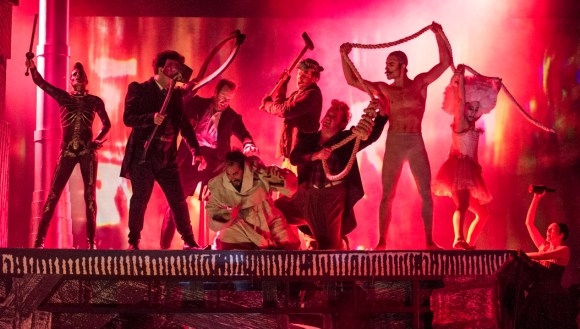Benvenuto Cellini (London Coliseum)

© Richard Hubert Smith
It’s a brave company that tackles Berlioz’s problematical first opera as the pitfalls are immense. First there’s the unwieldy ninety-minute first act, whose dramaturgy is shaky to say the least as characters drift in and out of sharp focus, and then there are the impossible vocal demands he makes of his eponymous hero: ridiculously high tessitura with excursions into the stratosphere that would make even the most ardent tenor want to run a mile.
These are some of the reasons why forty years have elapsed since Benvenuto Cellini was last staged in London; but English National Opera has grasped the nettle and given this dog’s dinner of a work as exciting staging as we’re ever likely to witness.
It made sense to entrust the production to maverick director Terry Gilliam following his brilliantly original staging of The Damnation of Faust three years’ ago, but could lightning strike twice? Would Gilliam’s pact with the devil come up trumps again, or would Old Nick come a-knocking on his door demanding his soul before he’d had chance to deliver?
I’m happy to report that he’s pulled it off again. Few directors have such an innate understanding of how to create meaningful spectacle on stage, possess the ability to persuade singers to act with such a sense of spontaneity, or handle an augmented chorus with such an unerring eye. Everything unfolded with cinematic fluidity and pizzazz, and as he also designed the sets (in collaboration with Aaron Marsden) there was more of a connect between the designs and stage direction than there had been for Faust.
It’s all well and good having a genius like Gilliam at the helm of the staging, but you also need as persuasive musical interpretation as possible to make us believe in Berlioz’s vision. Conductor Edward Gardner took some time to get into his stride: he drove the music hard to begin with, and a sense of the over-arching musical structure was lacking as his focus appeared too narrow. He seemed to be conducting from bar to bar rather than from phrase to phrase, and Act One needs all the help it can get. Luckily everything came into much sharper focus in the more dramatically and musically taut second act. It must be said that the playing of the ENO Orchestra was beyond reproach throughout.
You also need a Cellini for whom Berlioz’s fiendishly difficult writing holds no terrors, and in American tenor Michael Spyres the company has struck gold. Not only does he play the part of the dishevelled lovelorn sculptor to perfection, but he sings with a freedom and ease throughout this treacherously written part that took my breath away. Singing of this calibre would grace any of the major opera houses, and ENO should be congratulated for securing his exceptional talents.
Soprano Corrine Winters cemented the positive impression she made here as Violetta with a lusciously sung Teresa, whilst a third American, Nicholas Pallesen, delivered a superbly sung Fieramosca, Cellini’s rival in love and art. Willard White was his inimitable self as Pope Clement VII, whilst there was sterling support from Nicky Spence and David Soar in the tavern scenes. Paula Murrihy also made a strong impression in the trouser role of Ascanio – her second act duet with Teresa being one of the musical highlights of the evening. Only the voiceless Pavlo Hunka, as Teresa’s father, disappointed. Was he indisposed? If he was, we should have been told.
All in all this was a red-letter day for the company, and as it’s unlikely you’ll have the chance to see another staging of Benvenuto Cellini anytime soon, grab the opportunity to catch this with both hands.










